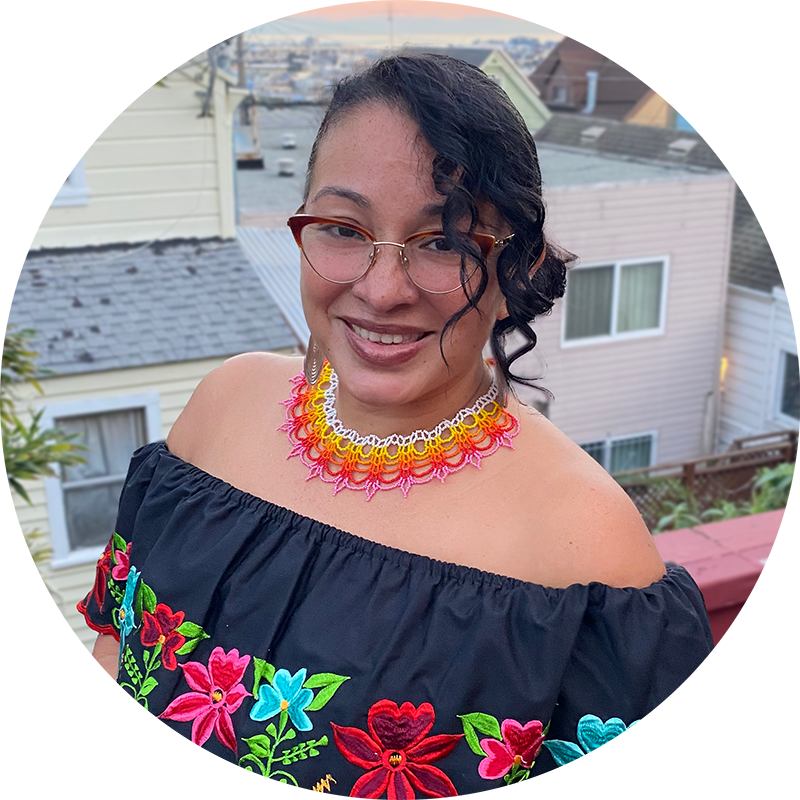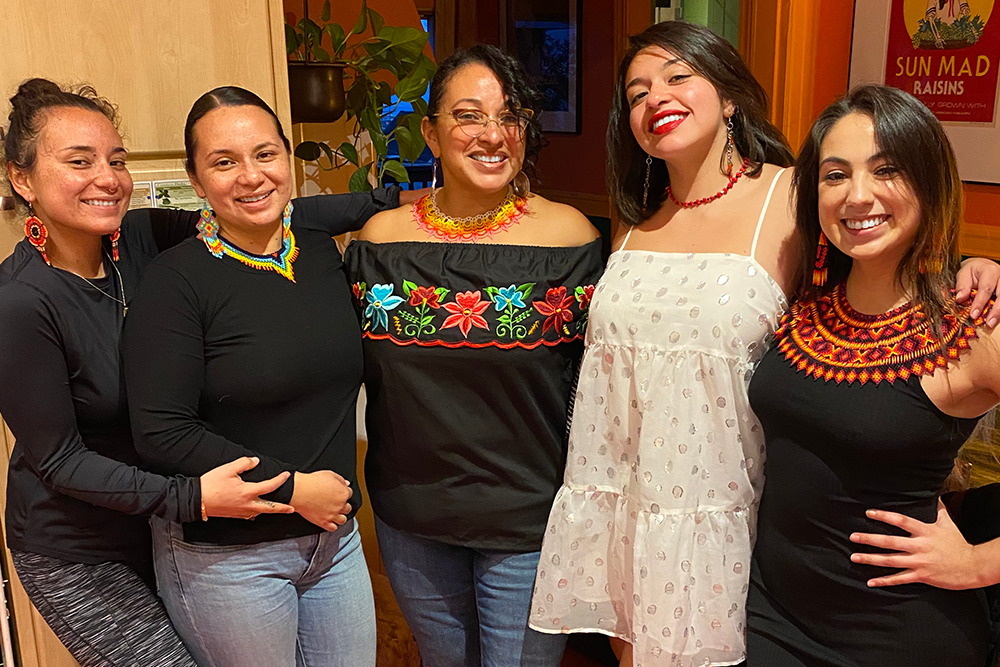Melissa Serrano says, “I have three loves: my daughters, my Latino community, and education.”

Working at Felton has provided Melissa with an opportunity to pursue several of those loves. She started with Felton in 2016 helping with the expansion of the child development programs. Now, Administration Support/Recruiter for Early Care and Education (ECE), she supports Administration Director for CYF/TAY, Noah Lopes with recruiting and compliance.
She also works part-time for City College of San Francisco in the Child Development Department teaching supervised field work experience, where educators take a course and then earn credit for working in a child development center, such as a Felton ECE center.
Both roles focus on workforce development and are informed by Melissa’s experiences in her earlier career as an afterschool provider for 20 years while raising her three daughters.
Below, Melissa shares her career and education journey.

Melissa is proud of her tribe of fellow Latinas. She serves on the board of the Chicana Latina Foundation, which helps Latinas achieve a college education. Melissa has worked in Early Care and Education since high school and supports Felton’s ECE program and all early childhood teachers.
Interviewer: Melissa, how has your role as a working mother impacted your choice of work?
Melissa: I was good at my craft because I was meant to be somebody’s mother. That’s the hat that I wear first. I know what I expect as a mother, and I respect other people’s children because I anticipate what their parents’ expectation is. They want their kid to be safe. They want their kid to be treated with respect. They want their kids to achieve, in that order.
Interviewer: Are there ways that you foster your appreciation of your ethnic roots?
Melissa: The second lens that serves me is being an active member of the Latino community.
I serve on the board of the Chicana Latina Foundation which encourages women to continue with college education by giving scholarships, leadership development, and support to women to show they are not alone in this journey. The goal is to make sure that our women obtain their degrees.
People always ask, “Why Latinas? It doesn’t seem equitable that you’re only educating this particular group.”
My answer is because Latinas are community focused. Anything that a Latina learns, they don’t keep it to themselves, they bring it home to their community. Any information that I have, I’m going to share it with my girls. I’m going to share it with my community. I’m going to share it with my coworkers whether it’s something small or something big.
The special sauce that we have is bringing people up. It is about sharing your story and rejoicing in it. If you speak Spanglish, you speak Spanglish. You celebrate that. My Spanish is not perfect, and I used to have a problem with speaking to people that had very proper Spanish, but through this organization, I learned that the way that I speak is good enough. I own it and I tell other people to own it.
Interviewer: Did you seek out the field of early childhood education early in your career?
Melissa: I fell into the field of early childhood education.
I was a junior in high school. And I told my God, I need money for prom. He said, get a job, girl.
A cousin happened to work in a child development center and helped me get in as a teacher assistant. After graduating high school, I worked for them full-time. My goal then was to be a guidance counselor. I believe I have found my way back to that through serving the last few years in workforce development.
I feel like I ended up doing what I intended to do which is to help others really find their place. I tell my students, “Early childhood education is a foundation for anything. You come here and you’re going to pick up people skills. You’re going to pick up communication skills, empathy, and tolerance. And these skills will carry you over to any profession.”
Interviewer: Where did you go to school as a youth, and did it meet your standards?
Melissa: As a native San Franciscan, I am a product of the public school system, and it’s also where I educated my own children, with greater results than I had.
Interviewer: How can parents overcome any systemic deficiencies in an educational system?
Melissa: The education system is a triangle, emphasizing parent advocacy and involvement.
It’s the student, the education institution, and the parents or the family, guardian, whoever they have. And those three forces working together will help students with their success.
Interviewer: You indicated your children have done well in their educational pursuits, is that correct?
Melissa: I am proud of my three educator daughters. My twins, Justina and Jessina, 28 years old, both have masters’ degrees and are school counselors working in the City. My youngest daughter Marivel, 25, was recently hired through the SF Unified School District to be a dance teacher and is earning a teaching credential for dance.
Education is kind of the family business. In fact, two daughters also subbed for Felton, earning clinical hours, while home on college breaks. Some refer to my daughters as ‘Miss Mendoza times three’ (using their father’s last name). They are my greatest accomplishments.
Interviewer: Melissa, it sounds as though they have had a great example in their mom.
Melissa: I am homegrown out of SF City College, since I was there for 20 years, as a mom, taking a class here and there. It wasn’t until my daughters went to college that I really picked up some momentum with my own education.
I had an opportunity to be part of a new cohort bachelor’s program, especially for child development workers. There is recognition in the City of San Francisco that people in the field get stuck in jobs and they do not move on with their education.
San Francisco State University developed an evening and weekend program with small groups and tutorial support that helped me. Although I didn’t achieve it until my 40s, I was successful, and later went on to the MBA program in organizational leadership at the University of San Francisco.
Interviewer: Was it challenging?
Melissa: My academic homegirl is Yohana (Yohana Quiroz, Felton’s Children Youth and Family Division Director). We went through both the BA and the MBA programs together.
The programs were challenging – spending time away from family and getting into student mode. But having a supportive community was helpful. And again, there is a peer, a Latina saying, “Come on, Melissa, we can do this.” She gave me the push. She signed me up for the orientation open house and we went.
Interviewer: Are you able to create that environment at Felton as an ECE educator?
Melissa: Yes, I pass it forward by teaching that ECE educators and guardians are setting up kids for their 20-year student career. You do that by making sure that the kids can see that the opportunities and the possibilities are endless. When they see people of color that look and sound like them, they realize, “I can do that someday, too.”
Understanding that Latinos measure their lives by milestones, I desire for other parents and guardians to feel the pride of being able to see their children accomplish graduation.
Send me to graduation any day and I feel one hundred percent fulfilled. And that’s where I will have that moment of just pure happiness.
Written By: Rachel Cohen
About Felton Institute: Founded in 1889, Felton Institute responds to human needs by providing cutting edge, evidence-based mental health and social services that transform lives. Felton Institute is a tax-exempt organization registered 501(c)(3) nonprofit under EIN 94-1156530.
Offering more than 50 acclaimed and honored programs that address homelessness, mental health, prenatal, adolescent, adult, and senior needs, Felton Institute provides services in San Francisco, Alameda, San Mateo, Marin, and Monterey counties. Felton’s social services and programs utilize the latest scientific research, combining cultural sensitivity, deep respect for client and staff, and a commitment to social justice.
Felton is the oldest non-sectarian and nonprofit social services provider in the City and County of San Francisco. For over a century, Felton Institute has been at the forefront of social service innovation, pioneering new approaches to meet underserved populations’ emerging needs. At the heart of our work is the belief that individuals and families in crisis must have access to services and resources to help them build on their inherent strengths and develop self-sufficiency. www.felton.org